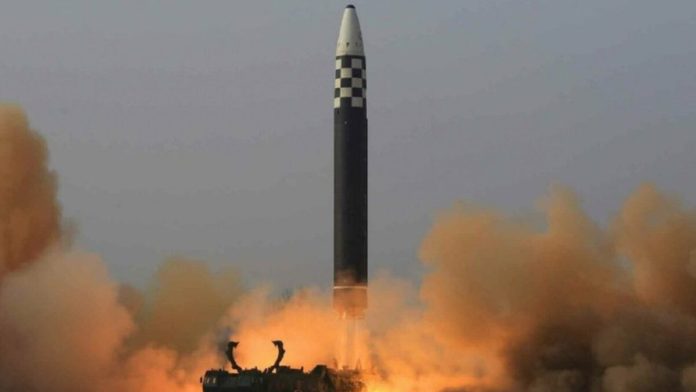This article was originally published on 1945.
North Korea’s ICBM Launch: A Response to Kim’s Miscalculation – On March 24, North Korea possibly tested its new Hwasong-17 Intercontinental Ballistic Missile (ICBM). Kim Jong-un broke part of his self-imposed moratorium on ICBM (and nuclear) tests that he promised the former U.S. president and the outgoing South Korean president in 2018. Kim must be made to understand he has miscalculated. The ROK/U.S. alliance must execute a new strategy.
The timing for this is not unusual and Kim’s action was not unexpected. On the same day, the U.S. president attended an emergency NATO meeting to discuss responses to Putin’s War in Ukraine. In South Korea, a contentious presidential transition is underway. North Korea is under enormous pressure from its failed economy, COVID mitigation measures, natural disasters, and sanctions. In addition, there are ongoing political, economic, and security challenges with the revisionist (China and Russia) and rogue (Iran and North Korea) powers around the world. North Korea is consumed with domestic problems and the U.S. is distracted by global challenges.
The Biden Administration has called for negotiations with North Korea anytime, anywhere, and without preconditions. Kim Jong-un has refused and likely demands one condition to allow his negotiators to come to the table: sanctions relief.
ICBM Test: Why Is North Korea Doing this Now?
There are likely four reasons for the ICBM test. The first and most obvious is that Kim does not want to be neglected by the U.S. and international community and he wants to be a spoiler in strategic competition. Next, he needs to externalize the threat to justify the sacrifices the Korean people must make to protect the regime. Third, but most likely short-term reason, is to extort sanctions relief. Lastly and most important, Kim continues to pursue advanced warfighting capabilities that will someday allow him to dominate the Korean peninsula by force.
Kim is executing a political warfare strategy and blackmail diplomacy by using increased tensions through missile and ICBM tests, threats, and provocations to gain political and economic concessions. At the same time, he is developing advanced military capabilities that will allow him to use force if necessary to achieve his long-term objective which is to dominate the Korean peninsula under the rule of the Guerrilla Dynasty and Gulag State. North Korea is executing a hostile policy.
How Should the U.S. ROK Alliance Respond to the ICBM Test?
Now is not the time to go wobbly especially when there will be calls to give Kim whatever is necessary to prevent future ICBM tests, especially a nuclear one. It is time to make Kim understand his miscalculation and for him to feel the consequences.
There are three immediate actions the ROK/U.S. alliance should take. First to understand Kim’s strategy and develop an alliance strategy based on such understanding. Second, is do not give in to Kim’s demands. If any concession is made Kim will assess it as a success and continue to execute his time-worn strategy. The third is to execute an information-based diplomatic strategy based on a foundation of strong defensive and offensive capabilities of the ROK/U.S. Combined Forces Command. These will not prevent another provocation, ICBM, or nuclear test, but they will take the necessary long-term coherent approach.
Dr. Su Mi Terry published a very timely essay in Foreign Affairs, North Korea’s Nuclear Opportunism – Why Kim Jong Un Chose to Exploit the Ukraine Crisis that coincided with the ICBM test. In it, she explains the least bad option for the alliance has its roots in the Cold War Strategy. She recognizes that this requires a long-term approach.
There are three strategy proposals that should form the basis for new policy and strategy. The first is Frederick Vincenzo’s An Information-Based Strategy to Reduce North Korea’s Increasing Threat. The intent of this proposal is “to develop an information campaign designed to reduce the risks of conflict or regime collapse by convincing regime elites that their best options in these circumstances would be to support ROK-U.S. Alliance efforts.” In sort put pressure on the elites and second tier leadership.
Dr. Jien Baek of Harvard’s Belfer Center wrote A Policy of Public Diplomacy with North Korea. She describes it as “a principled and pragmatic approach to promote human rights and pursue denuclearization.” The alliance must execute a human rights upfront approach even as it pursues denuclearization. The key tool is information.
The third contribution is a monograph from the Foundation for the Defense of Democracies, Maximum Pressure 2.0: A Plan for North Korea. Together with Terry, Vincenzo, and Baek it provides a comprehensive strategy that focuses on the long-term security problem on the Korean peninsula, the threat posed by the Kim family regime using five concepts integrating all the elements of national power.
To read more, please click here.


